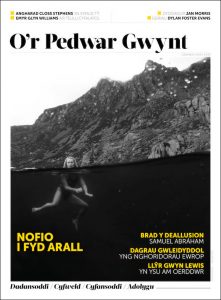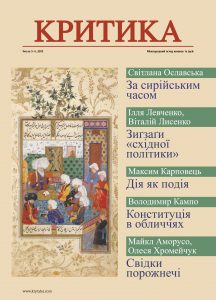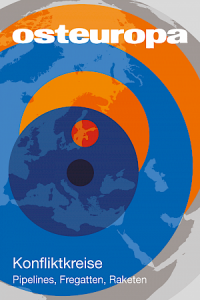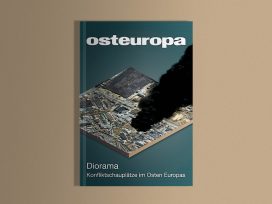The biggest story ever
- Eurozine Review
8/2019
‘O’r Pedwar Gwynt’ finds its place; ‘Wespennest’ claims climate for culture; ‘Krytyka’ appeals for constitutional democracy; ‘Osteuropa’ debates elitism and protest; and ‘Soundings’ critiques #MeToo.
O’r Pedwar Gwynt (UK) 1/2019

Welsh-language review of books O’r Pedwar Gwynt – a new Eurozine partner – attends to the complex relation between the personal and the political, and explores the inevitability of politics in human experience. ‘In this issue, we are reminded that our most unsettling personal experiences are essential to our ability to understand what is good and how best to live in society,’ writes editor Sioned Puw Rowlands.
Earthing Europe: Rowlands recalls Bruno Latour’s warning that Europe cannot hide from history and shrink from its responsibilities. The prospect of ecological destruction inevitably reframes the age-old question as to what it means to inhabit a place, a piece of land, she writes: ‘It is more urgent than ever that we grasp the importance of striving to expand our moral vocabulary. This can only be attempted if we are open to ideas and experiences which are initially foreign to us.’ ‘Rather than philosophy or politics, might literature, uniquely open as it is to incommensurable ideas and experiences, be most suited to this task?’
Genius loci: Llŷr Gwyn Lewis explores Freud’s notion of the unheimlich in relation to the work of Welsh-language essayist and poet, T. H. Parry-Williams (1887–1975), arguing that our most important experiences come to us when we are at our most unstable. Lewis reflects on the significance of a specific place – Oerddwr, Rhyd Ddu in Snowdonia – to Parry-Williams and how it enabled him to discover ‘the familiar in the unfamiliar’. Today, we would do well to look inwards in our attempt to deal with large-scale political forces, Lewis writes.
Everything flows: Angharad Penrhyn Jones meditates on the experience of swimming all year round in the rivers of her home on the Dyfi estuary in mid-Wales. ‘In the water, we have to accept uncertainty, obscurity, the darkness beneath, and this is a lesson for life itself. The river never remains the same from one moment to the next. “No man ever steps into the same river twice,” said Heraclitus. “Everything flows and nothing stays.”’
History of emotions: Angharad Closs Stephens reflects on her experience of moving back to Wales after fifteen years. ‘How is one to understand the portrayal of this place as the most wonderful, splendid place on earth and simultaneously as a source of shame?’ As she attempts to re-root herself and rediscover her culture, she asks what compelled her to return; what kind of emotions are tied to the Brexit vote, and what the political history of those emotions are.
Also: M. Wynn Thomas on the ‘empathic fiction’ of Welsh novelist Emyr Humphreys and American novelist Marilynne Robinson. Goodness ‘ is a particularly complex virtue’, one not commonly explored in fiction.
More articles from O’r Pedwar Gwynt in Eurozine; O’r Pedwar Gwynt’s website
Wespennest (Austria) 176 (2019)

We know so much about climate change, writes Wespennest editor Andrea Roedig, so why do we see and feel nothing? For Maximilian Probst und Daniel Pelletier, writing in an issue of the Austrian magazine devoted to ‘climate’, the fault lies with journalists:
‘Climate change is, in its extent and impact, the biggest story ever – but in journalism has never become a dominant subject, unlike terrorism, the Islam question, or rightwing nationalism. This state of affairs is often justified with audience quotes: climate change is a marginal topic because the public is only marginally interested in it. That is a lazy argument, since it overlooks the power of agenda setting. If climate change hadn’t been sidelined, interest in it would be greater.’
Climate history: If Wespennest commits one of the ‘seven deadly sins of journalism’ listed by Probst und Pelletier, then it is not to allow climate to ‘languish in the corner of natural science’. On the contrary, contributions discuss ‘climate’ beyond the framework of the environment and sustainability. Talking about her work on the ‘cultural history of climate’, literary scholar Eva Horn explains her interest ‘in reaching a new understanding of climate in cultural, social and even individual terms, as something that concerns us personally, politically and culturally. The project of modernity was about cleanly separating nature and culture. However, we are permanently dealing with hybrids – and climate is one such. Technological solutions won’t help so long as we understand “culture” as something that makes us completely independent of the weather.’
Ecology of literature: Climate scientists are also becoming interested in literature, and particularly how it can contribute to overcoming defensive responses. While writer in residence at the Potsdam Institute for Climate Impact Research, the Icelandic writer Sjón drew the following conclusion:
‘Only by putting literature into an ecological template can we understand what role writers might have in saving the earth and humankind. In the ecological template, literature appears as an organic whole, stretching back to the dawn of humanity. Sometimes, literary works are spoken or sung, sometimes acted out or written, often in a language spoken by many, more often in the languages that belong to only a few. It is an entity that changes constantly according to content and circumstances, in both its clearest and most obscure manifestations, but that plays a key role at all times in the survival of the people that cultivate it.’
More articles from Wespennest in Eurozine; Wespennest’s website
Krytyka (Ukraine) 3–4/2019

The unexpected election of Volodymyr Zelensky has left many people in Ukraine and abroad pondering the strengths and especially the weaknesses of the Ukrainian political system. In Krytyka, legal scholar Volodymyr Kampo makes the case that persistent ‘constitutional nihilism’ has kept Ukraine from reaching its political and economic potential.
For nearly three decades, writes Kampo, Ukrainian politicians have appropriated this document in pursuit of their own political ends. The Leonid Kuchma presidency (1994–2005) and its several abortive attempts at constitutional reform were emblematic of this nihilism. Kampo urges today’s politicians to work to uphold the existing constitution, rather than constantly resorting to short-sighted efforts to amend it. Not only would a true constitutional democracy strengthen the rule of law and help the development of a robust, mature political system, it is also a crucial precondition for the growth of Ukraine’s economy.
Maidan: Philosopher Maksym Karpovets analyses the ‘corporeal and emotional experience’ of the Maidan through the lens of performance theory. As a collective creative act, the revolution allowed ideas to find physical expression. Its organic yet coordinated action provided an alternative to the injustice and cynicism of the Yanukovych regime. ‘The spontaneous performative nature of the Maidan stood in antithesis to the unchanging order that had led to a sense of hopelessness and despair in Ukraine.’ The state’s violence against the protesters in February 2014, Karpovets argues, then pushed it from the performative to the ‘vital’.
Middle East: Svitlana Oslavska describes the impact of the influx of Syrian refugees on life in the southern Turkish city of Gaziantep, less than 100 kilometres from Aleppo. Through conversations with Syrian women and local Turkish cultural activists, she explores the limits of a Derridean approach to hospitality and asks what it means to build meaningful community. Family life and work, religious practice and art: all are made richer – if more complicated – by this life together.
More articles from Krytyka in Eurozine; Krytyka’s website
Osteuropa (Germany) 1–2/2019

In Osteuropa, Ilya Kalinin describes a political conflict in Russia familiar in the West: one between liberal ‘elites’ and anti-liberal ‘left-behinds’. Like many western critics of neoliberalism, his approach begins with the elites rather than their opponents. In Russia, however, the issue is not elite responsibility for illiberal counter-hegemonic insurgency, but the responsibility of a counter-hegemonic liberal elite for its failure to successfully challenge an illiberal establishment.
The fundamental mistake of the protest movements in Russia in 2011–2012 was, argues Kalinin, to conflate ‘individual ethical choice’ with ‘political attitude’. This was typical of an apolitical tendency among the intelligentsia formed during the late Soviet era, which itself recycled the old, eighteenth-century opposition between culture and the state. In 2011–12, the tendency received a ‘neoliberal upgrade’ in the form of the ‘ideology of creativity’. ‘A cultural barrier was erected between those who had made the right choice and opted for the post-industrial future, and those who had remained stuck in the industrial past.’
For all its progressive posturing, the movement was anachronistic in its analysis of power in Russia. The current regime is ‘not a new version of the Soviet model, but firmly anchored in global neoliberalism’. As such, it ‘can only be dealt with if one cites concrete social economic facts. Talking about values doesn’t get you anywhere, because the regime claims all possible values as its own: liberal as well as conservative, national and imperial; democratic as well as authoritarian. Every alternative programme is thereby absorbed, leaving the opposition’s claim to autonomy as its sole distinction from the regime. This allows the regime to portray it as marginal, as a tiny group fundamentally out of touch with the interests of the majority.’
Response: Lev Gudkov and Natalia Zorkaya argue that the true reasons for the failure of the protest movement lie elsewhere: namely, in the systematic repression of opposition politics over the previous decade. By 2011, there was neither a party nor an independent media able to coordinate the interests of the protesters or ‘channel social tensions in the direction of a democratic contest based on rational arguments’. Hence, the only possible form of protest in 2011 was to ‘violate the pre-determined boundaries that allowed only demonstrative exhibitions of loyalty’.
Also: Otto Luchterhandt on Russia’s violation of international law in the Sea of Azov; Roland Götz on the hypocrisy of opposition to North Stream 2; Georg Dox on Austria’s special relationship with Russia; and a dossier on the Russian book trade.
More articles from Osteuropa in Eurozine; Osteuropa’s website
Soundings (UK) 71 (2019)

In an issue of Soundings on feminism, the editors note that ‘it is impossible ever to separate out a specific form of inequality, and to see it as existing independently of other structures of privilege and disadvantage, or to see the experiences of any one group in isolation from the multiple and intersecting forms of discrimination and exclusion in which they are formed.’ Contributions on feminist debates and movements internationally bear this principle out.
Feminist economics: Ruth Pearson argues that understanding the centrality of women’s role in ‘daily and generational reproduction’ is key to any feminist political economy: ‘An economy that is sustainable and stable in the long term and is not based in exploitative gender and other relations needs a more holistic notion of investment than the narrow Keynesian idea of investing in physical infrastructure … Public investment in the social infrastructure – in skilled and trained teachers, health and social care workers, and in schools, hospitals, clinics and day centres – delivers benefits to the economy in the short, medium and long term.’
Neoliberal feminism: Catherine Rottenberg flags up troubling aspects of the feminist ‘renaissance’, in particular its individualistic tendency. ‘By neglecting any kind of structural critique, [#MeToo] elides the women who are perhaps most vulnerable to violence – sexual or otherwise – such as immigrants, domestic workers, and low-income women of colour. #MeToo, so the criticism goes, contributes to the neoliberal disarticulation of the systemic nature of gendered and sexual violence, while ultimately placing the onus on women to come forward and speak their pain.’
Politics of whiteness: Thanks to #MeToo, ‘sexual violence has been correlated with the “everyman” rather than the “bad man”’, writes Alison Phipps. However, ‘as white and privileged women in the West now say “time’s up” to men via corporate media platforms, and as accused men appear in the same media platforms defending themselves, the politics of sexual violence can appear to be a conversation between white people about who is in control.’
Brazil: Liv Sovik writes on Jair Bolsonaro’s far-right coalition in Brazil. The new regime, reports Sovik, sees the opposition as being backed up by a conspiracy of ‘cultural Marxists’ and ‘gender ideologists’ in the universities. She also describes how a connection has come to light between the Bolsonaro family and the extreme right paramilitary forces that executed Rio de Janeiro town councilwoman and human rights activist Marielle Franco on 14 March 2018.
More articles from Soundings in Eurozine; Soundings website
This is our 8/2019 Eurozine review. Click here to subscribe to our reviews, and you also can subscribe to our newsletter and get the bi-weekly updates about latest publications and news on partner journals.
Published 8 May 2019
Original in English
First published by Eurozine
© Eurozine
PDF/PRINTNewsletter
Subscribe to know what’s worth thinking about.




